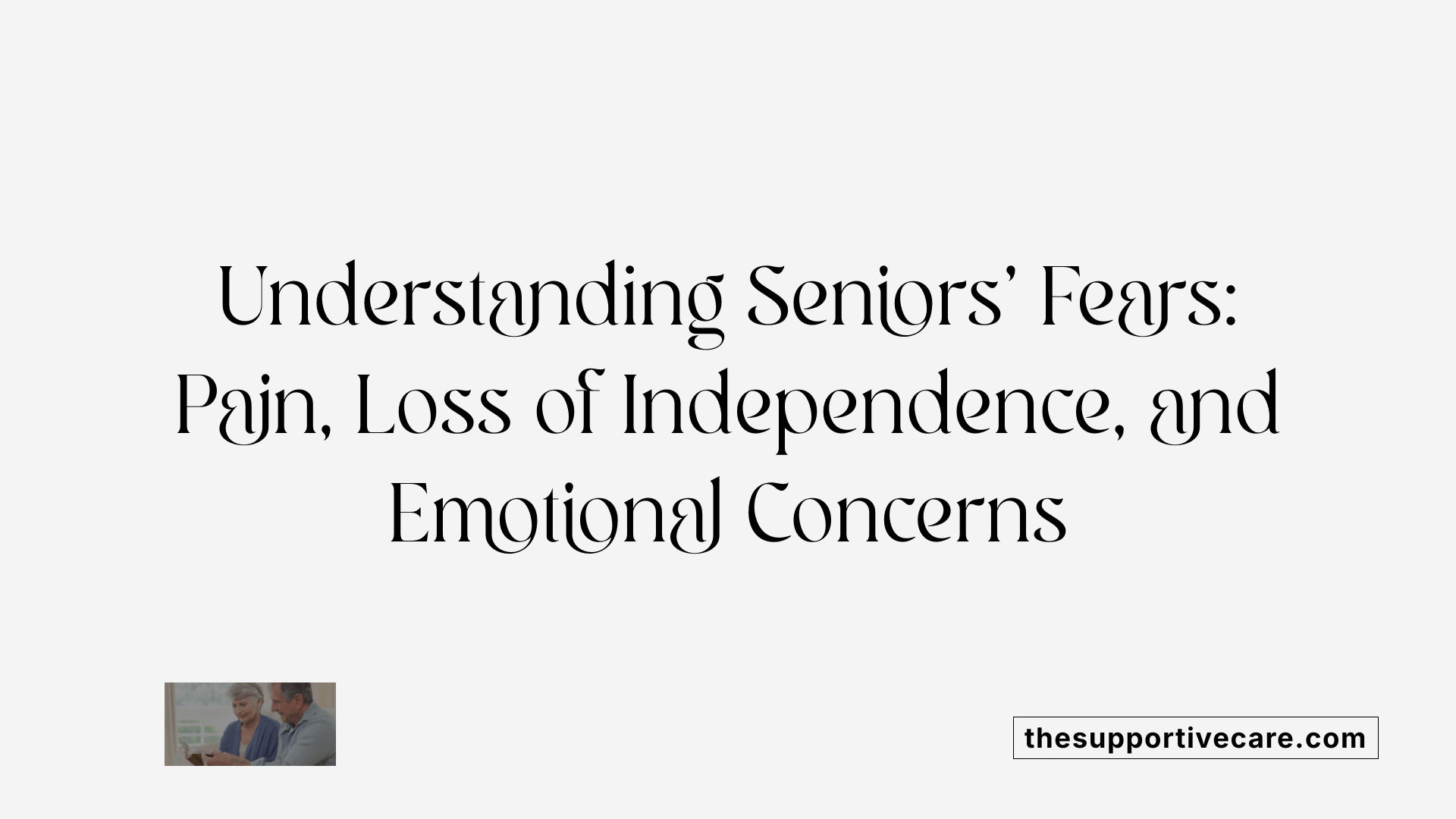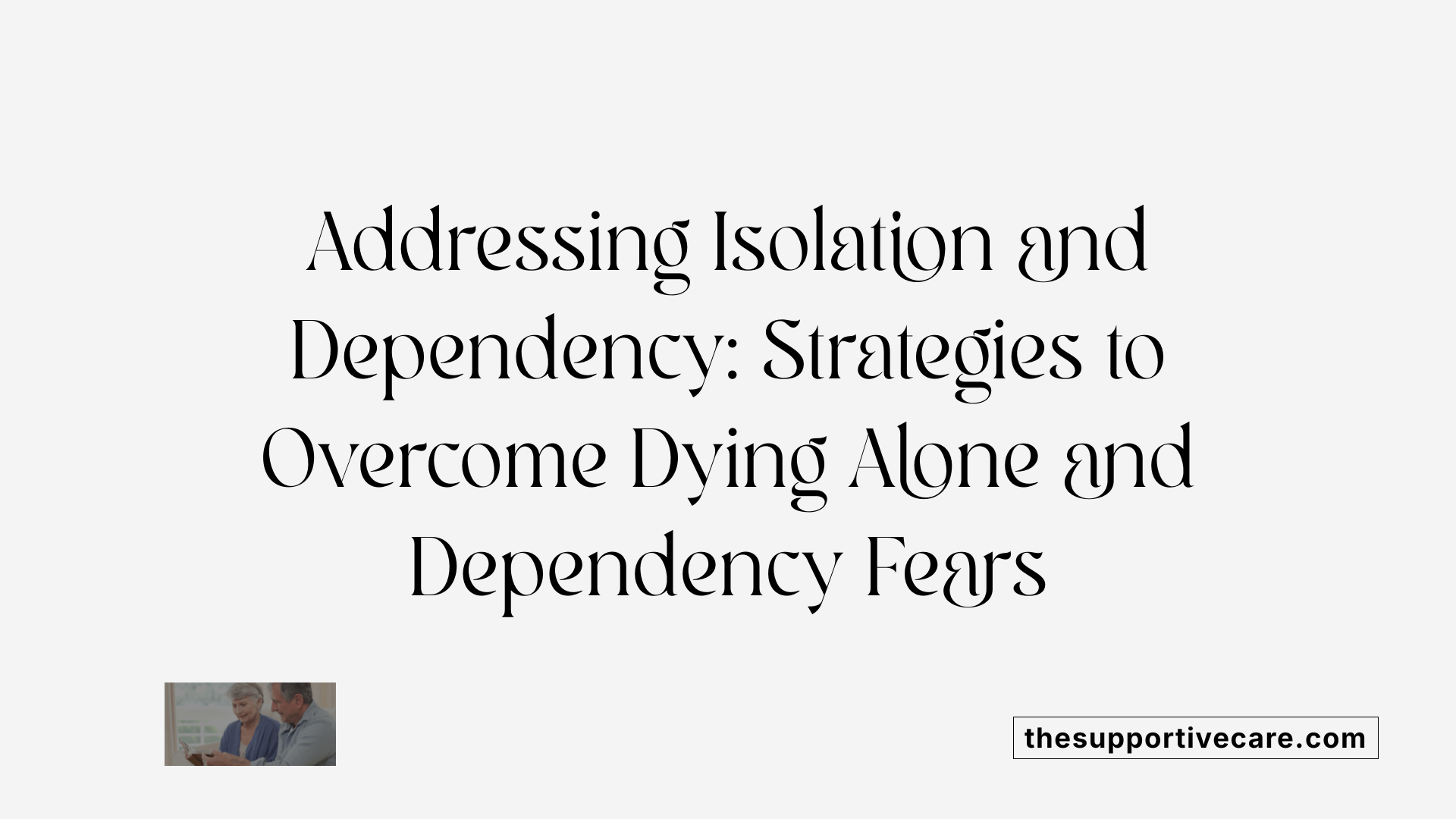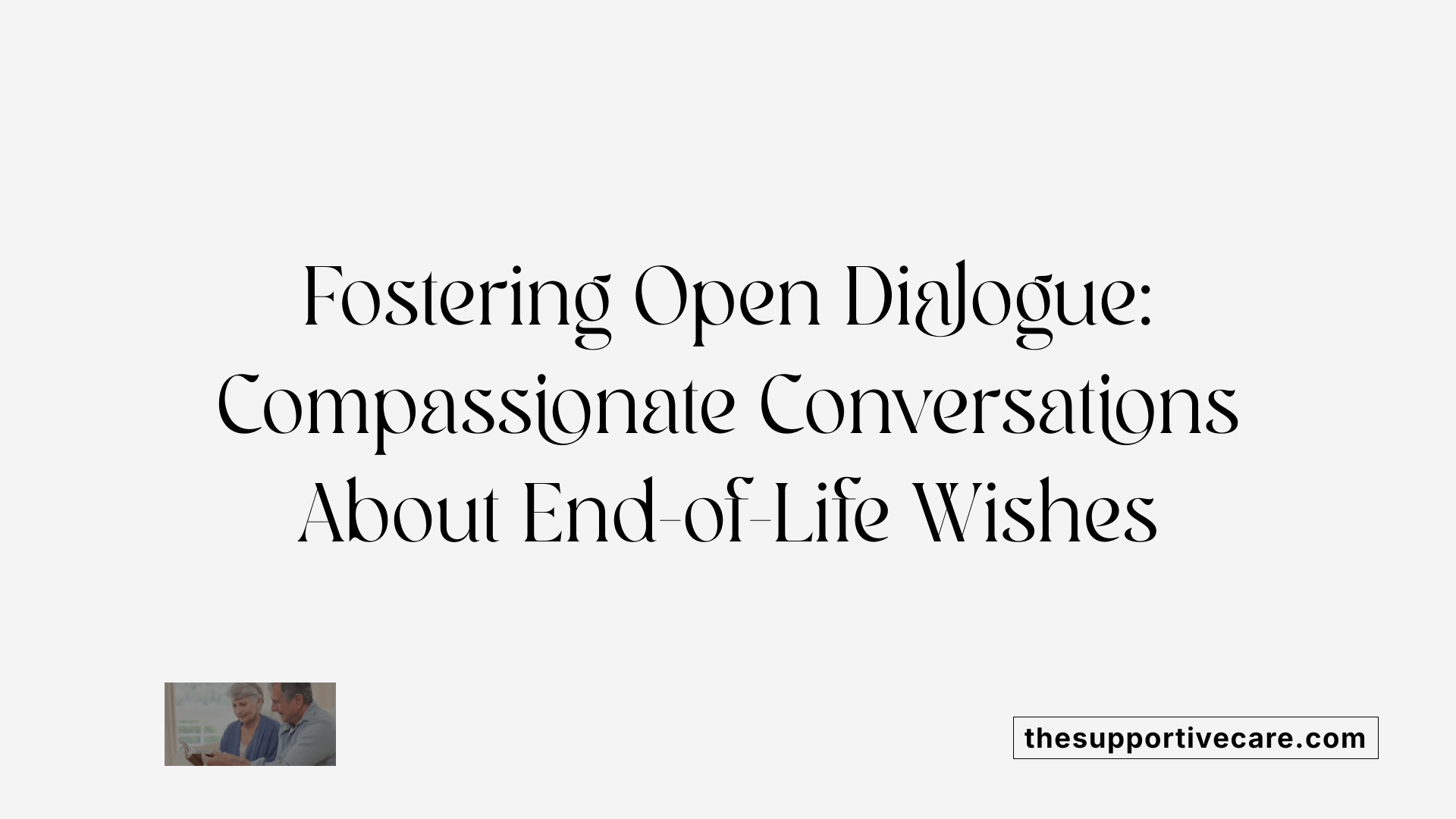Understanding and Addressing the Deep-Rooted Fears of Aging Seniors
As seniors face the inevitable realities of aging and mortality, their fears surrounding death and dying can become a significant source of emotional distress. While many elderly individuals exhibit a natural acceptance of death due to life experience, the concerns about pain, suffering, dying alone, and losing independence persist. Addressing these fears requires a nuanced understanding of their psychological and emotional dimensions, alongside employing compassionate counseling strategies tailored to their unique needs.
Common Fears About Death and Dying Among Seniors

What are common fears about death and dying among seniors?
Many seniors experience worries centered around the dying process rather than death itself. The most common fears include experiencing pain, suffering, or a prolonged and distressing death. These concerns often arise from a desire to avoid suffering and maintain comfort in their final days.
Another prevalent fear is loss of independence. Seniors dread losing the ability to care for themselves and becoming reliant on others, which can sometimes lead to feelings of vulnerability and diminished self-worth. This concern is particularly strong in long-term care settings where dependency might increase.
While many seniors perceive death as a natural part of life and tend to report low levels of death anxiety, the fears related to the actual process remain substantial. Anxiety about pain and lack of control over the circumstances of their passing often persists, even among those accepting mortality.
Gender also plays a role in shaping these fears. Studies indicate that women tend to have greater concerns about the death of loved ones and how it might affect them emotionally, reflecting their often deeper engagement in caregiving roles and emotional connections.
The mental and physical health of seniors significantly influences their fears. Those with serious health issues or chronic conditions may harbor more anxiety about potential suffering or loss of dignity. Conversely, some find comfort in acceptance, driven by their life experiences and a sense of having lived enough.
Addressing these fears involves open discussions, effective pain management, emotional support, and fostering acceptance. Recognizing individual differences and providing personalized care can help reduce fears and facilitate a more peaceful end-of-life experience.
The Role of Compassionate Counseling in Facilitating Acceptance of Mortality

How can counseling help seniors overcome fears related to death?
Counseling plays a vital role in helping seniors confront and manage their fears about death. It provides a safe, empathetic space where individuals can openly share their anxieties and feelings about mortality without judgment. Through therapy, seniors learn coping strategies that make their fears more manageable and less overwhelming.
Therapeutic approaches like Cognitive Behavioral Therapy (CBT) and Acceptance and Commitment Therapy (ACT) are particularly effective. CBT helps modify unhelpful thoughts about death, challenging negative beliefs and replacing them with more realistic perspectives. ACT encourages acceptance of mortality as a natural part of life and fosters living according to personal values.
Additionally, techniques such as exposure therapy—where seniors gradually face death-related scenarios—can lessen their fear response over time. Life review therapy involves reflecting on personal achievements, relationships, and life stories, which helps foster acceptance and provides emotional closure.
Counselors often use personalized assessment tools to identify specific fears and tailor interventions accordingly. These tailored psychotherapeutic interventions can significantly reduce death anxiety, promote emotional resilience, and improve overall well-being in older adults. Ultimately, compassionate and expert counseling helps seniors approach the end of life with dignity, peace, and acceptance.
Psychological and Emotional Support Techniques for Seniors
What are effective emotional support techniques for seniors facing end-of-life fears?
Providing emotional support to seniors confronting fears about death involves multiple approaches that foster understanding, validation, and reassurance. Open, empathetic communication allows elders to express their feelings and concerns without judgment, helping them feel heard and supported.
One of the most effective methods is cognitive-behavioral therapy (CBT). This approach focuses on identifying negative thoughts related to death and replacing them with more balanced perspectives. Studies show that CBT can significantly reduce death anxiety by challenging unhelpful beliefs and promoting adaptive coping strategies.
Mindfulness practices offer another powerful tool. By encouraging seniors to stay present and grounded, mindfulness helps reduce anxiety about the future and the unknown, fostering a sense of peace and acceptance.
Spiritual support plays a vital role in alleviating fears. Engaging in prayer, spiritual counseling, or faith-based activities addresses existential concerns and provides comfort rooted in personal beliefs.
Addressing unresolved issues is also crucial. Techniques such as life review or legacy projects enable seniors to reflect on their lives, clarify their values, and find meaning. Conversations about regrets, achievements, and relationships can foster closure and emotional relief.
Supporting autonomy and dignity through advance care planning ensures that seniors retain control over their final wishes. Respectful discussions about preferences for care, autonomy, and end-of-life decisions empower elders and lessen fears of losing independence or being a burden.
Creating an environment that encourages social connection, family involvement, and honest dialogues contributes to emotional wellbeing. Involving loved ones and caregivers in these conversations helps build a network of support, making seniors feel valued and less isolated.
In summary, a combination of therapeutic, spiritual, and practical approaches—centered on respect, dignity, and personal preferences—is essential in providing effective emotional support. These strategies not only ease fears but also help seniors find peace and meaning as they approach life’s final stages.
The Impact of Mental Health Interventions in Reducing Death Anxiety

What role do mental health interventions play in managing death anxiety among seniors?
Mental health interventions are essential tools in helping seniors cope with the fear of death, which is often rooted in anxiety, uncertainty, and unresolved emotional issues. These interventions primarily focus on providing psychological support, teaching coping mechanisms, and fostering resilience.
Psychotherapy options such as cognitive behavioral therapy (CBT) are highly effective in reducing death-related fears. CBT helps seniors identify and challenge negative thoughts about mortality, replacing them with more realistic and calming perspectives. Additionally, exposure therapy allows individuals to confront death-related stimuli in a controlled and safe environment, gradually decreasing avoidance and fear.
Reminiscence therapy is another valuable approach. It involves reflecting on personal life experiences, achievements, and meaningful moments. This process helps seniors find purpose, reaffirm their identity, and accept the aging process, which can significantly diminish death anxiety.
While medications like anti-anxiety drugs may be prescribed temporarily during periods of acute stress, they are not the primary treatment for death anxiety. The limitations of medication in this context stem from their temporary effects and potential side effects, making therapeutic approaches more sustainable and effective in the long term.
Overall, these mental health strategies are instrumental in enhancing emotional well-being. They promote resilience, reduce fears associated with mortality, and improve the quality of life for elderly individuals. The combination of psychological support, life review, and gradual exposure offers a comprehensive approach to managing death anxiety among seniors.
Addressing Fears of Dying Alone and Losing Independence

What strategies are effective for addressing specific fears such as dying alone or loss of independence?
Fears of dying alone and losing independence are common among elderly individuals, but there are practical strategies to help manage these concerns.
One of the most effective approaches is providing reassurance and emotional support. Family members, caregivers, and healthcare professionals can foster open conversations that allow seniors to express their fears and clarify misconceptions. Discussing personalized care plans and advance directives helps older adults feel they retain control over their end-of-life choices, which can reduce feelings of helplessness.
Involving companionship services, such as caregiver support, social engagement activities, and community programs, diminishes the fear of loneliness. Utilizing technology, like video calls and social media, allows individuals to connect with loved ones even when physical presence isn't possible.
Creating a supportive environment through hospice and palliative services also alleviates fears by emphasizing comfort, dignity, and emotional well-being. These services often include counseling, spiritual support, and practical assistance, all aimed at fostering peace of mind.
Understanding that some individuals prefer solitude during their last days can also help reframe fears about dying alone. For some, choosing to be alone is about experiencing peace and control over their final moments, especially when suffering or family conflict is involved.
Moreover, psychological interventions such as cognitive-behavioral therapy (CBT) and exposure therapy are proven to decrease specific anxieties related to death and independence loss. These therapies help individuals challenge negative thoughts, develop coping skills, and build resilience.
Additionally, addressing underlying mental health conditions like generalized anxiety disorder and depression contributes to a more balanced mental state.
Overall, a combination of compassionate communication, personalized planning, technological connections, and professional psychological support can significantly mitigate fears related to dying alone and losing independence, leading to a better quality of life in older age.
Supporting Empathetic End-of-Life Conversations and Family Involvement
 Creating a supportive environment for end-of-life discussions is essential to help seniors express their wishes and fears openly. When timing and setting are appropriate, caregivers should gently initiate conversations in a calm and private space. This setting allows for honest dialogue without rush or distraction.
Creating a supportive environment for end-of-life discussions is essential to help seniors express their wishes and fears openly. When timing and setting are appropriate, caregivers should gently initiate conversations in a calm and private space. This setting allows for honest dialogue without rush or distraction.
Active listening plays a crucial role. Caregivers should attentively hear the senior's concerns, validate their feelings, and respond with compassion. Acknowledging emotions and refraining from judgment creates a safe space where elders feel respected and understood.
Involving healthcare providers and family members in planning ensures that everyone shares an accurate understanding of the senior’s preferences. These discussions can also clarify medical choices and respect the individual's cultural and personal values.
Documenting wishes through advance directives and legal arrangements safeguards the individual's desires. These documents serve as clear guidelines for medical and emotional support, reducing uncertainty during critical times.
Building shared understanding and peace of mind involves ongoing communication, revisiting conversations, and updating wishes as needed. Encouraging open dialogue fosters trust among seniors, families, and care teams.
Addressing the importance of empathetic communication, research indicates that when caregivers demonstrate genuine empathy during end-of-life discussions, it alleviates anxiety and promotes dignity. Using straightforward, honest language and responding to nonverbal cues further enhances the quality of these conversations.
Importantly, preparing ahead by discussing fears—such as dying alone or suffering—can significantly reduce distress. Involving professionals like social workers or chaplains can provide additional emotional support. Technology, including video calls, offers alternative ways to connect when physical presence isn’t possible.
Ultimately, maintaining an open, respectful, and compassionate approach in these discussions ensures that seniors feel valued and their wishes honored—leading to a more peaceful and dignified end-of-life experience.
Resources and Support Systems for Families and Caregivers
Supporting seniors and their families through the emotional challenges of aging and facing death requires access to a variety of resources. Counseling services are a vital component, offering one-on-one therapy, group support, and specialized programs to help process fears, grief, and unresolved issues. Support groups, both in-person and virtual, connect individuals experiencing similar struggles, providing shared understanding and comfort.
Educational materials—ranging from books like "7 Lessons for Living from the Dying" by Karen Wyatt to podcasts such as End-of-Life University—encourage thoughtful conversations about mortality, dignity, and what constitutes a meaningful death. These resources help normalize discussions about death, alleviating the stigma and fear often associated with it.
Spiritual care providers, hospice, and palliative care teams play a crucial role in addressing existential concerns. They help patients and families explore spiritual beliefs, find peace, and navigate fears of dying alone or the unknown. These services also include practical support like advance care planning, ensuring wishes are documented and respected.
Tools for facilitating open dialogue about death are increasingly available, such as community programs like death cafes, which create safe environments for candid conversations. Similarly, books, podcasts, and community seminars serve to educate and reduce anxiety around mortality.
Organizational guidance from groups such as the American Psychological Association or the Anxiety and Depression Association of America provides evidence-based strategies for managing anxiety, depression, and grief related to end-of-life issues. The Foundation for End-of-Life and other nonprofit organizations offer additional techniques and programs focused on grief recovery, acceptance, and finding meaning during this vulnerable stage.
By leveraging these resources, families and caregivers can better support their loved ones, fostering peace, dignity, and emotional resilience as they approach life's final chapter.
The Impact of Compassion-Based Therapy on Tolerance of Ambiguity and Death Anxiety
Recent research underscores the promising role of compassion-focused therapy in addressing age-related fears of death and uncertainty. A notable quasi-experimental study conducted in 2019 among elderly residents of Khoram Abad nursing homes exemplifies this approach.
The study involved 30 elderly participants, with a balanced distribution of males and females, averaging 64 years old. These individuals were split into an experimental group that received targeted compassion-based therapy and a control group that did not undergo any intervention. Over two months, the experimental group participated in eight ninety-minute sessions designed to cultivate self-compassion and empathy, aiming to bolster their emotional resilience.
Data collected before and after the intervention revealed significant findings. The participants in the therapy group demonstrated increased tolerance to ambiguity — reducing fears related to the unknown aspects of death — and experienced a notable decrease in death anxiety levels.
The positive outcomes of this study suggest that compassion-focused therapy can be a valuable tool in easing fears of death among the elderly. It offers a compassionate pathway to improve mental health, diminish despair, and foster acceptance of mortality.
Implications for Practice Incorporating compassion-based approaches into end-of-life care can enhance emotional support. Healthcare providers, therapists, and caregivers may consider integrating these techniques to help seniors build resilience and face death with greater serenity. Tailored therapy sessions addressing individual needs, emphasizing warmth, understanding, and empathy, can be particularly effective in fostering a sense of peace.
The combination of scientific validation and practical application illustrates the potential of compassion-centered interventions to transform the way we support aging populations confronting mortality.
| Aspect | Description | Additional Notes |
|---|---|---|
| Study Type | Quasi-experimental | Involved pretest and posttest measures |
| Population | Elderly residents at Khoram Abad nursing homes | 30 participants, mean age 64 |
| Intervention | Eight sessions of compassion-based therapy over two months | 90-minute sessions, focus on empathy and self-compassion |
| Outcomes | Increased ambiguity tolerance, decreased death anxiety | Statistically significant improvements |
| Practical Application | Integrate compassion therapy into elder care programs | Enhance emotional well-being and acceptance |
How can therapeutic methods like cognitive-behavioral therapy help alleviate death anxiety in seniors? Therapeutic methods such as cognitive-behavioral therapy (CBT) effectively help seniors confront and reduce death anxiety by changing negative thought patterns and beliefs about mortality. Through cognitive restructuring, seniors learn to challenge catastrophic assumptions, replacing them with more realistic perspectives. Exposure techniques gradually introduce death-related thoughts, aiding desensitization and comfort. Psychoeducational elements and coping strategies further promote acceptance and resilience. Overall, CBT aims to normalize death, foster a sense of peace, and support emotional well-being at life's end.
Fostering Peace Through Practice and Compassion
Ultimately, addressing seniors' fears of death through compassionate counseling can significantly improve their quality of life, fostering a peaceful acceptance of life's natural conclusion. Employing a blend of psychological support, empathetic communication, and personalized care strategies ensures that elderly residents feel valued, understood, and supported in their final journey. As caregivers and health professionals embrace these practices, they not only alleviate suffering but also honor the dignity and emotional well-being of seniors, paving the way for a more compassionate approach to end-of-life care.
References
- Common Senior Fears and How to Overcome Them: Death and Dying
- Facing a Fear of Death: Compassionate Care for Seniors and ...
- How to Navigate End-of-Life Care with Compassion - Aging Together
- End-of-Life Counseling & Therapy Techniques
- The Importance of Mental Health Care for the Elderly in Hospice
- Providing Care and Comfort at the End of Life
- How to get more comfortable with death | Psyche Guides
- The Effectiveness of Compassion-Focused Therapy on Ambiguity ...
- Coping With the Fear of Dying Alone - Choosing Therapy
- How To Navigate End-of-Life Conversations with Compassion



































































































